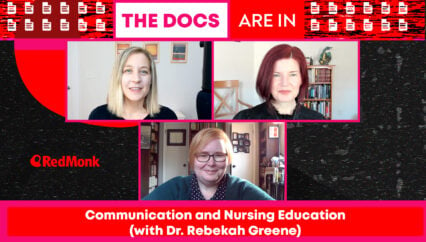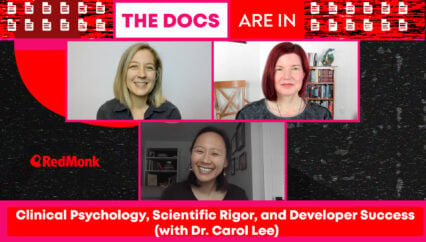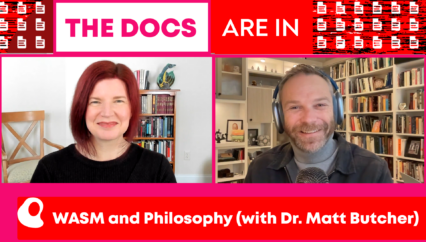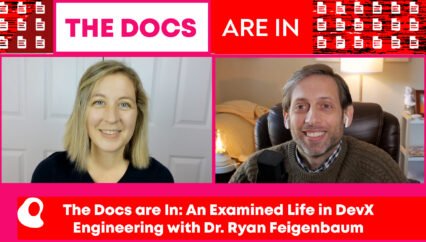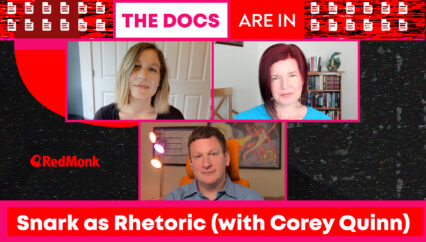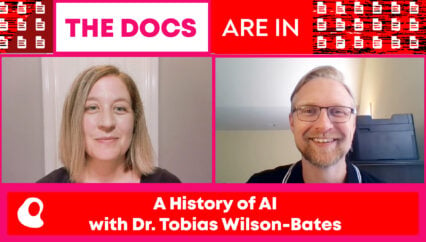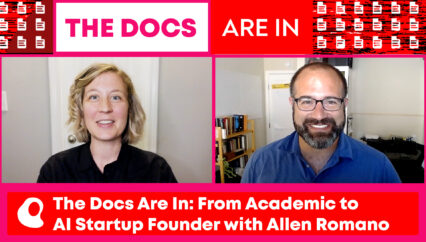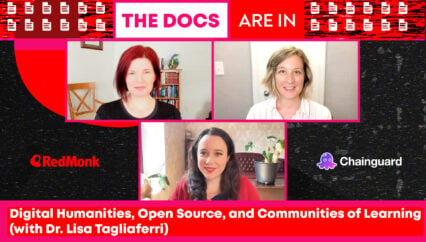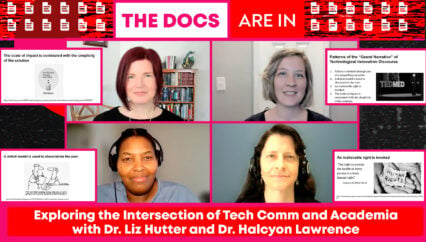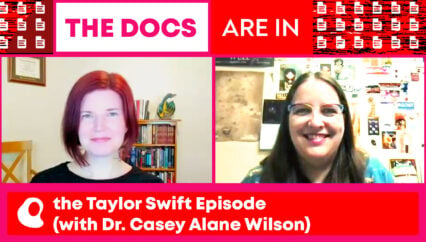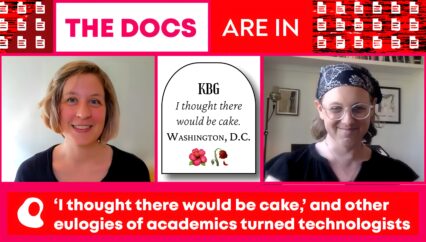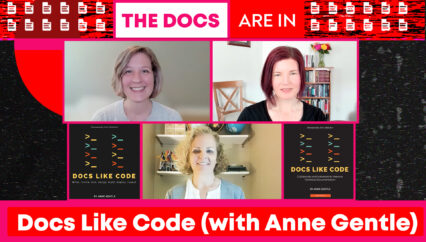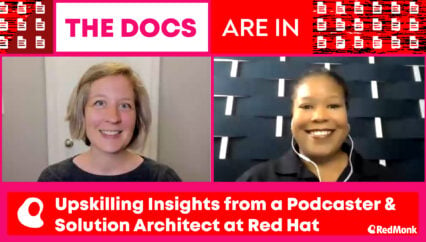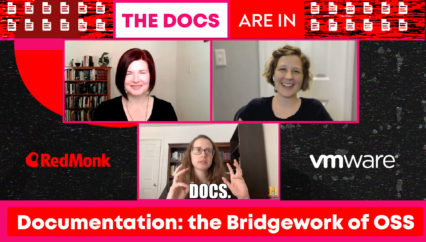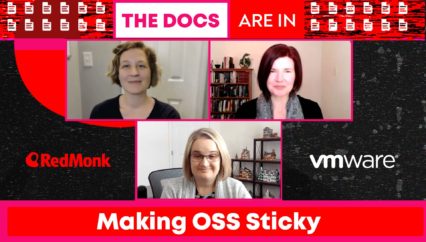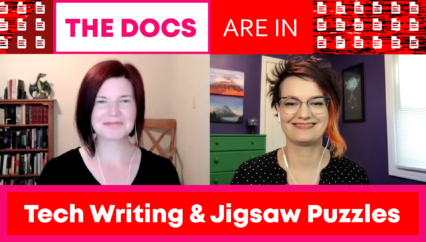RedMonk’s Dr. Kate Holterhoff and Dr. Kelly Fitzpatrick (who each have a Ph.D.) kick off a new series where they sometimes talk to other docs and sometimes talk about documentation. In this video Kelly interviews Kate about Kate’s excellent research on certifications in the tech industry.
This was a RedMonk video.
Rather listen to this conversation as a podcast?
Transcript
Kelly: Hi everyone. This is Kelly Fitzpatrick from RedMonk and I am absolutely delighted to be speaking to RedMonk’s newest analyst, Dr. Kate Holterhoff. Kate, how are you today?
Kate: I am doing so well. How about yourself?
Kelly: I mean, we’re having rainy, cold weather as opposed to whatever much more delightful weather I assume you are getting in Atlanta right now, but otherwise, fine.
Kate: A little sweltering, but it is nice out.
Kelly: Since Kate joined the firm earlier this year, RedMonk has two analysts with PhDs. For those of you who don’t know my back story, I am a medievalist by training, as you can tell, probably, by the books and dragon art on my background bookshelf. My PhD is related to that. And fun story: my first interaction with RedMonk was as as a speaker at the 2015 Monktoberfest, where I got to talk to tech folks about medievalism and gaming. I have also worked in the tech industry and just prior to coming to RedMonk, I taught computer science majors technical communication at Georgia Tech, which is where I met Kate.
Kate: Yes. Yes. Our history goes back and we met I think, before your. No, no, that’s right. Move to Atlanta, 2016. Oh, my gosh. You knew RedMonk before we even started the postdoc. That is a deep history.
Kelly: I did. But I worked with you first.
Kate: Yes. Really? Oh, my God. Okay. All right. Time is a flat circle. Okay, well, a little bit about my backstory. I got my PhD at Carnegie Mellon. I am a Victorianist by training, although with my pedigree, as you can imagine, I taught a lot of engineers while I was there, especially in their communication program. And from there, I got a postdoc at Georgia Tech, met my wonderful colleague, and also taught some technical writing, technical communication sort of courses for their CS majors as well. And then after the postdoc wrapped up, I decided to move into front end engineering at a digital marketing agency in Atlanta, did that for a couple of years and recently moved into doing analyst work, which really synthesizes my history, I think, in a really compelling way. And it’s been an exciting move.
Kelly: Yeah. And, Kate, you’ve heard me say this on many calls: like, my greatest triumph of 2021 was convincing you to come work with us at RedMonk. Like “Go leave your front end web development job and come be an analyst” in part so that we can collaborate on topics like this, where our academic backgrounds and kind of tech industry experience and expertise intersect, and thus we are kicking off a new series–“The Docs Are In”–where we do just that.
Kate: Yeah, I think it’s a great collaboration, especially because it’s such a good double entendre. “Docs” meaning not only the fact that we are doctors but also that we have great interest in documentation. Your blog especially has really dug into that subject.
Kelly: Yeah, absolutely. And as much as we absolutely at some point needs to do a “The Docs Are In” on docs today. I was hoping to talk about certifications in the tech industry in no small part because you have been working on this excellent ongoing series of articles on certifications. So to kick off our The Docs Are In series. What are some of the highlights of your certification research so far?
Kate: Well, I have been doing a really interesting series of interviews with folks on the topic of certifications, and I tend to focus on kind of a range of questions tied into them. A lot of them, especially in the beginning, kind of came out of my background in higher education. I was really interested in the fact that certification programs tend not to be accredited, which struck me as kind of problematic. But I have learned that there’s there’s a lot of merit to kind of stepping away from a sort of higher education type of model. I’ve also written a little bit about the fact that developers, especially kind of mid and senior level developers, tend not to talk too much about certifications. They tend to be something that folks who are just entering the workforce are more interested in.
Kate: And then I guess kind of the final thing that I think is pretty interesting on that, in this sort of larger research project, is trying to break down the stereotype that hiring managers are not interested in certifications. I think there was a real sort of taboo on certifications coming in the mid 2000s that a lot of cloud providers are working to undermine and just show that there really is, can be value with I guess trying to pursue these certifications for upskilling and working on what other folks are calling “reskilling” the labor pool.
Kelly: And I think we talk a lot about how not all developers are alike, but it seems like not all engineering managers are like either.
Kate: Yes, very true.
Kelly: So the role of education, training and assessment in tech has always interested me, partly because I also come from that academic background. But I very much have to remind myself that academia and the tech industry do not think about things like certifications the same way. They don’t have the same end goals, they don’t have the same same processes often. And with you coming from that academic background, what has surprised you the most about certifications in the tech industry?
Kate: Oh, that’s a tough one. But I would say one of the things that has really struck me that I hear repeatedly is just the enthusiasm that a lot of certification holders have for these products. You know, certifications are something that, you know, the stereotype of engineers being lazy, certifications seem to go against that that idea. There really is this desire to learn more about the not only the sort of vanilla technologies like Kubernetes, but also the the vendor-driven products, how they can fit into the sort of larger, I guess, sort of lifestyle of continuously learning about new technologies and making sure that folks are using the most up to date and best practices available to them.
Kelly: So you’ve decided to embark on an entirely new career during a pandemic. Other people are doing that as well. And you’ve written a little bit about this, but from what you’ve seen so far, how has COVID 19 kind of changed the certification landscape in tech? And how might the current kind of prospective economic climate change that in the future?
Kate: Well, again, there was a lot of surprises from the folks that I spoke with. A number of individuals have said that there really wasn’t a big change that they saw in in the way that their certifications were being adopted, the number of applicants and the demographics that they represented.
Kate: I would say that the biggest change that I learned about is the testing style. So many of these certification providers were moving into more online testing, having the test itself be proctored in an online manner. And this was really resisted by a number of the test takers in the experience of some of the vendors that I’ve spoken with. Red Hat specifically had mentioned that there just wasn’t this interest in moving that particular aspect online that folks enjoyed going to this sort of third party outside location in order to concentrate on doing the best that they could on the on these exams. And now that just isn’t possible because of the COVID 19 pandemic.
Kate: So just being forced into doing things in a remote setting has been a huge shift for the industry, one that most of the vendors saw coming, but not everybody has been happy about. And now it’s kind of taken for granted. And I don’t think there’s any going back, according to the individuals I’ve spoken with, this is just going to be something that’s here to stay.
Kelly: And I very much feel that upside to the “Going to a place to do a thing” like from back when we were in offices. Not being an everyday thing but for instance like I’m, I’m filming from my home office and I don’t know when my cat Ishka is going to make an appearance–especially because she knows that you are on the screen, Kate.
Kate: Of course
Kelly: And she definitely wants to see you.
Kate: I love Ishka.
Kelly: Like especially if you’re doing something that can be very stressful like an exam. Having that quiet space could be, can be very, very useful. But then now people who can’t make it to those, those spaces have to have other options, which is probably great.
Kate: Yes, I think it’s going to be on the whole, a better situation for folks. But that sort of flexibility is something that maybe is going to come back around once we can do more things in person where you have the option to go somewhere in-person or have it proctored online.
Kelly: Like I remember when we had options, that was, that was great. Well, Kate, I’m looking forward to see whatever you write next. And I also love your recent pieces on like stock photos and GIFs. But what can we expect next from you on certifications?
Kate: Well, I’ve got a couple of things on the back burner simmering. However, the big topic that I’m really excited to get into is community, how certifications build community around either technologies or the vendors that are providing these in a more specific way. How does community sort of come out of that, whether that’s in these sort of conferences that are based around them, I think is going to be a big move that I transition into in my next series.
Kelly: Well, again, I will be looking forward to that.
Kelly: And as we near the end of our very first, The Docs Are In episode, my brain is also already planning out some of our future episodes where I know I’m hoping to bring in some guests who may or may not also also be docs, so tune in for that as well, in addition to checking out Kate’s further research on certifications and other things.
Kelly: Thank you to those of you who are out there listening today, this is Dr. KellyAnn Fitzpatrick.
Kate: And this is Dr. Kate Holterhoff. And with that, the docs are out.
Resources
- Kate’s research on certifications
- Kelly’s research on tech comm and documentation
- Kate’s post: “Don’t Let Imagery Undermine Your Marketing Website”
- Kate’s post: “3 Best Practices for Tech Website Videos”
